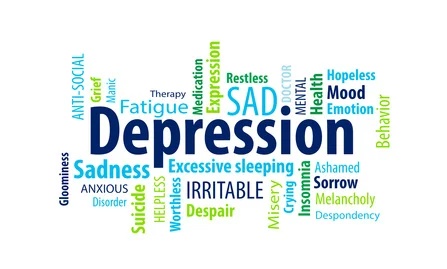Wondering what the difference is between having “the blues” and a diagnosis of major depression? A diagnosis of depression should be made by a mental health professional, however knowing what constitutes major depression may be helpful as you consider the possibility of treatment. (Diagnosis is made using criteria from the American Psychiatric Association’s Diagnostic and Statistical Manual, or DSM. The most current edition is the DSM-5.)
The first criteria of depression is that symptoms must have been present nearly every day for at least a two-week period. This is an important factor in that major depression doesn’t lift easily. Think about the last time you had “the blues”—most likely it lasted a few days, maybe up to a week before it faded away and you started to feel more like your usual self. Major depression requires at least two weeks for diagnosis but the reality is that it can last for months or even years, underscoring the importance of seeking treatment earlier rather than later.
The diagnostic criteria for depression also require five or more of the following symptoms with at least one of those being either “depressed mood” or “loss of interest or pleasure in activities.”
Depressed mood most of the day, nearly every day. This mood might be characterized by sadness, emptiness, or hopelessness.
Markedly diminished interest or pleasure in all or almost all activities most of the day, nearly every day. People with depression can usually identify some specific activities that they used to like but are no longer enjoying. Examples might be socializing, watching sports on television, reading, or working out.
Significant weight loss when not dieting, or weight gain. In other words, the person has lost their appetite, thus the weight loss. Sometimes we see weight gain either due to increased appetite or an attempt to self-comfort through food.
Inability to sleep or oversleeping nearly every day. Often people with depression will say that they have significant trouble getting out of bed; they feel overwhelmed and chronically exhausted. They literally may spend most of their time in bed. On the other hand, people with depressionmay have trouble sleeping due to ruminative thoughts or will awaken early and be unable to return to sleep.
Psychomotor agitation or retardation nearly every day. People who have major depression may be fidgety and restless or, alternatively, they may move more slowly than usual to such a degree that it is noticeable by others.
Fatigue or loss of energy nearly every day. Individuals with depression will often report overwhelming exhaustion and depleted energy. Sometimes they will make a comment that they are being lazy; it is important to recognize (and to remind its sufferers) that depression includes “real” physical symptoms such as loss of energy.
Feelings of worthlessness or excessive or inappropriate guilt (which may be delusional) nearly every day. Excessive or inappropriate guilt refers to guilt that is undeserved or that has been blown out of proportion in the depressed person’s mind. Someone with depression may be convinced, for example, that their father’s death from cancer was their fault because they didn’t visit enough.
Diminished ability to think or concentrate, or indecisiveness, nearly every day.
Recurrent thoughts of death (not just fear of dying), recurrent suicidal ideation without a specific plan, or a suicide attempt, or a specific plan for committing suicide.
In addition, the criteria require:
That these symptoms cause clinically significant distress or impairment in social, occupational, or other important areas of functioning,
That the episode is not due to the effects of a substance or to a medical condition. This is important as some medical conditions (e.g. hypothyroidism) produce symptoms consistent with depression but which disappear when the condition is treated. Additionally, some substances, such as alcohol, can produce and/or worsen symptoms of depression.
That the symptoms are not better explained by other psychiatric disorders such as schizoaffective disorder or schizophrenia.
That, to distinguish depression from bipolar disorder, there cannot have been a manic or a hypomanic episode in the person’s past.
Sometimes people with depression will express dismay that they are depressed, reporting that they have “no reason” to be sad. Others are able to pinpoint a specific event or disappointment that seemed to start the depressive episode. Causes of depression can include life events, inherited traits, brain chemistry, or biological differences. Some individuals with depression will report that they have struggled with bouts of depression since early childhood while others will not have their first episode until adulthood.
In addition to major depression, another mood diagnosis is persistent depressive disorder (PDD), also referred to as dysthymia. PDD is a chronic depression that is present for most days over a two-year period. In contrast to major depression, symptoms of PDD are milder (though it is not unusual, over time, for the individual to develop additional symptoms that would then prompt a diagnosis of major depression).
To be diagnosed with PDD, the following criteria from the DSM-5 must be met:
Depressed mood for most of the day for the majority of days over at least a two-year period (in children the duration must be at least one year and mood can be irritable rather than depressed).
While depressed, two or more of these symptoms must be present: poor appetite or overeating, unable to sleep or sleeping too much, low energy or fatigue, low self-esteem, poor concentration, and feelings of hopelessness.
During the two-year symptom period, the symptoms have not been absent for more than two months at a time.
The individual does not meet criteria for certain other psychiatric disorders.
Substance abuse or another medical disorder does not explain the symptoms.
Making a diagnosis of a mood depression is a clinical judgment made by a qualified medical or mental health professional. If you suspect that you or someone you care about is suffering from major depression, effective treatments, including medication and therapy, are available.
Please, if you are feeling suicidal, seek help immediately by calling 911, going to your nearest emergency room, or calling the National Suicide Prevention Lifeline at 1-800-273-8255. People at the lifeline are available 24 hours a day, 7 days a week and provide services in both English and Spanish.
If you would like additional information about depression or would like to schedule an appointment with Dr. Jana Drew, please call 512-960-5265 or contact her here. Dr. Drew offers free 30-minute consultations and would welcome the opportunity to work with you regarding your concerns.



